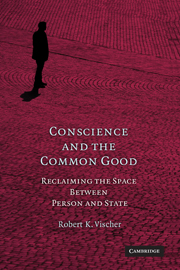
- Cited by 3
-
Cited byCrossref Citations
This Book has been cited by the following publications. This list is generated based on data provided by Crossref.
Stitzlein, Sarah M. 2015. Improving Public Schools Through the Dissent of Parents: Opting Out of Tests, Demanding Alternative Curricula, Invoking Parent Trigger Laws, and Withdrawing Entirely. Educational Studies, Vol. 51, Issue. 1, p. 57.
Parker, J. Clint 2016. Implications of Christian Truth Claims for Bioethics. Christian Bioethics, Vol. 22, Issue. 3, p. 265.
Xu, Ben and Bartel, David 2019. Conscience, cynisme et espoir. Monde chinois, Vol. N° 58, Issue. 2, p. 94.
- Publisher:
- Cambridge University Press
- Online publication date:
- June 2012
- Print publication year:
- 2009
- Online ISBN:
- 9780511804267
- Subjects:
- Socio-Legal Studies, Law, Ethics, Philosophy




